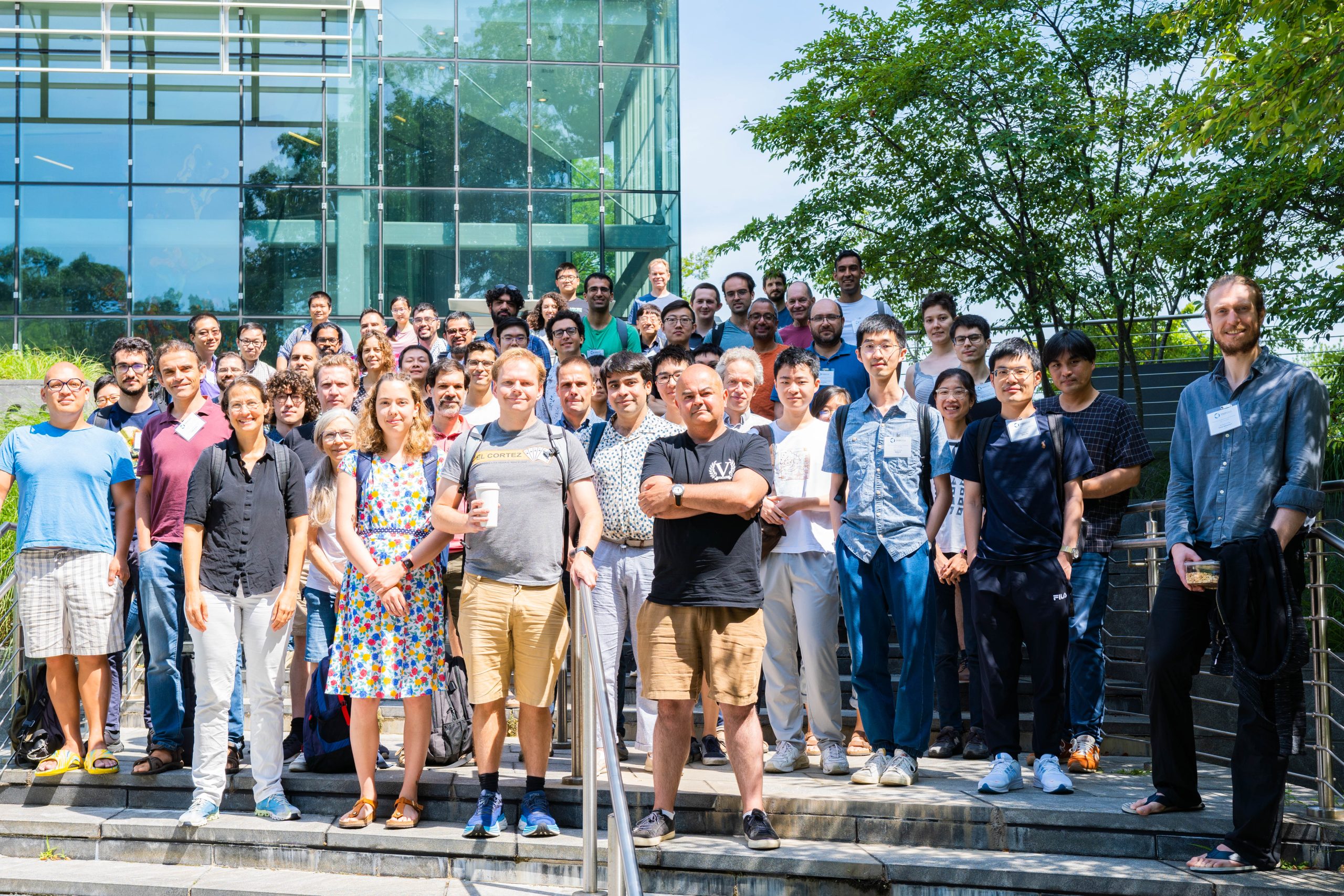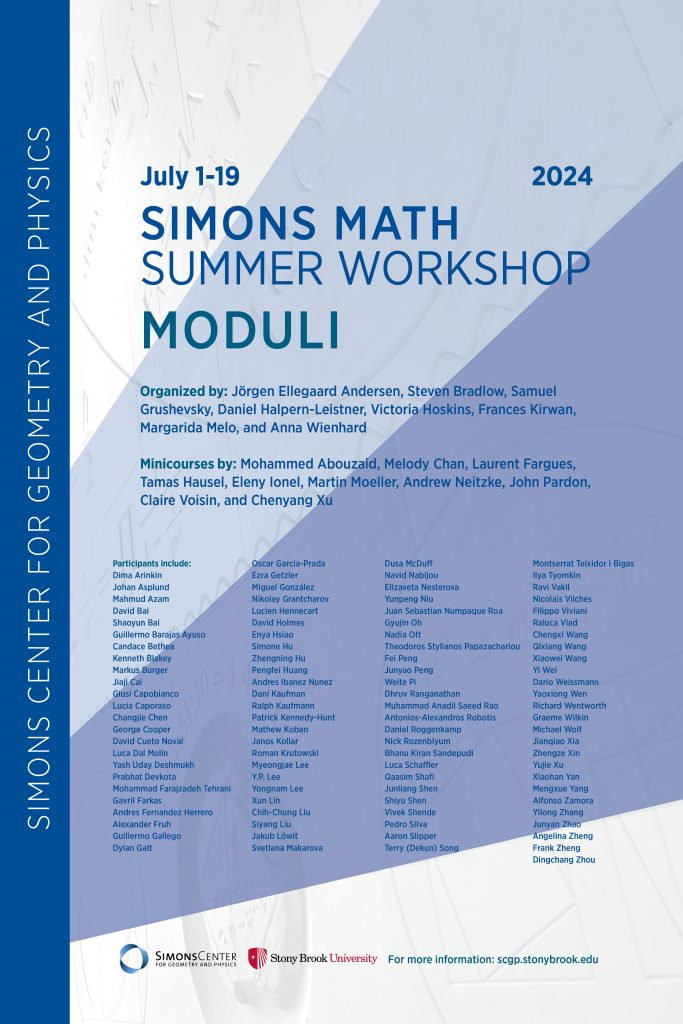Participant ListWeek 1 ScheduleWeek 2 ScheduleWeek 3 ScheduleSummer Concert Series View Videos TRANSPORTATION SCHEDULE
Organized by:
-
-
-
-
-
- Jörgen Ellegaard Andersen (The University of Southern Denmark)
- Steven Bradlow (University of Illinois Urbana-Champaign)
- Samuel Grushevsky (Stony Brook University)
- Daniel Halpern-Leistner (Cornell University)
- Victoria Hoskins (Radboud University Nijmegen)
- Frances Kirwan (The University of Oxford)
- Margarida Melo (Universita Roma Tre)
- Anna Wienhard (Max Planck Institute for Mathematics in the Sciences)
-
-
-
-
-
For more information on previous Simons Math Summer Workshops, please visit:
PROGRAM DESCRIPTION
Moduli theory is a fundamental topic that shows up in different forms across much of modern mathematics. Researchers approach the study of moduli problems and moduli spaces using a vast array of techniques from different disciplines. Historically, ideas in moduli theory have crossed disciplines many times, to spectacular effect, but currently the topic is so broad that it can be challenging for researchers from different disciplines to find a common forum for exchanging ideas and perspectives.
The goal of this workshop is to create such a forum by bringing together experts from different fields studying moduli theory. We hope to build a sense of community around the topic, and to seed the next generation of interdisciplinary discoveries. The workshop is organized by the managing editorial board of the newly launched open access journal, Moduli, which shares the same goals of building community and exchange of ideas around moduli theory. There will be a one-day celebration of the launch of the journal during week 2.
The workshop will feature several minicourses from leading experts targeting both advanced graduate students in their discipline and established researchers in other disciplines. It will also feature talks from senior researchers sharing broad forward-looking visions for their fields. Each week will have a broad theme, but we expect participants to stay for multiple weeks, to allow for interactions between fields. There will be ample free time in the afternoons to facilitate discussion and collaboration during the workshop. Social activities for participants will be organized to further foster informal interactions.
Minicourses by: Mohammed Abouzaid, Melody Chan, Laurent Fargues, Tamas Hausel, Eleny Ionel, Martin Moeller, Andrew Neitzke, John Pardon, Claire Voisin, Chenyang Xu
Forward looking talks by: Marc Burger, Nikita Nekrasov, tbc
Week 1 (July 1-5)
Theme: Moduli in differential and symplectic topology
There have been many instances in which moduli theory has played a definitive role in the study of manifolds. This week will focus on two such examples: K-stability and pseudoholomorphic curves.
Celebrated work of Chen, Donaldson,and Song resolved a conjecture of Donaldson and Tian by showing that on a Fano manifold, the condition of K-stability, formulated in the language of algebraic geometry, is a sharp obstruction to the existence of a Kaehler-Einstein metric. Further developments have revealed deep connections between concepts in birational geometry and differential geometry, and that K-stability plays an essential role in the moduli theory of higher dimensional Fano varieties.
Gromov introduced pseudoholomorphic curves as a tool in symplectic topology in 1986, and since then the study of these and related moduli problems has blossomed in many different directions. Moduli spaces of pseudoholomorphic curves are used to define enumerative invariants of symplectic manifolds, such as Gromov-Witten invariants, and, as well as richer invariants like the Fukaya category and its generalizations. At the same time, this theory has led to very fruitful interactions between symplectic topology and other disciplines, including mathematical physics, algebraic geometry, and gauge theory.
Despite its long history of development, many new developments in the subject hinge on ever-more sophisticated understanding of the structure of these moduli spaces. Examples include the construction of Floer-theoretic invariants defined over the integers and other spectra, the study of Gopakumar-Vafa invariants, and the introduction of “virtual” techniques inspired by derived geometry.
Talk Schedule Week 1
| Time | Title | Speaker | Location |
| 8:30am | Breakfast | N/A | SCGP Cafe |
| 9:30am | Mini-course 1: Moduli spaces of pseudo-holomorphic curves: a glimpse into their structure | Eleny Ionel | SCGP 102 |
| 10:45am | Coffee Break | N/A | SCGP Cafe |
| 11:30am | Mini-course 1: Derived moduli spaces of pseudo-holomorphic curves | John Pardon | SCGP 102 |
| 12:45pm | Lunch | N/A | SCGP Cafe |
| 3:30pm | Tea Break | N/A | SCGP Cafe |
| Time | Title | Speaker | Location |
| 8:30am | Breakfast | N/A | SCGP Cafe |
| 9:30am | Mini-course 1: K-moduli space of Fano varieties | Chenyang Xu | SCGP 102 |
| 10:45am | Coffee Break | N/A | SCGP Cafe |
| 11:30am | Mini-course 2: Moduli spaces of pseudo-holomorphic curves: a glimpse into their structure | Eleny Ionel | SCGP 102 |
| 12:45pm | Lunch | N/A | SCGP Cafe |
| 12:45pm | Group Photo | N/A | SCGP Lobby |
| 2:30pm | Cuspidal curves, scattering diagrams and the stabilized ellipsoidal embedding conjecture. | Dusa McDuff | SCGP 102 |
| 3:30pm | Tea Break | N/A | SCGP Cafe |
| 7:00pm | Special Banquet Dinner: The Waterview | N/A | The Waterview, Port Jefferson, NY |
| Time | Title | Speaker | Location |
| 8:30am | Breakfast | N/A | SCGP Cafe |
| 9:30am | Mini-course 2: Derived moduli spaces of pseudo-holomorphic curves | John Pardon | SCGP 102 |
| 10:45am | Coffee Break | N/A | SCGP Cafe |
| 11:30am | Mini-course 2: K-moduli space of Fano varieties | Chenyang Xu | SCGP 102 |
| 12:45pm | Lunch | N/A | SCGP Cafe |
| 2:30pm | Mini-course 3: Moduli spaces of pseudo-holomorphic curves: a glimpse into their structure | Eleny Ionel | SCGP 102 |
| 3:30pm | Tea Break | N/A | SCGP Cafe |
| July 4th Holiday Center is closed |
| Time | Title | Speaker | Location |
| 8:30am | Breakfast | N/A | SCGP Cafe |
| 9:30am | Mini-course 3: Derived moduli spaces of pseudo-holomorphic curves | John Pardon | SCGP 102 |
| 10:45am | Coffee Break | N/A | SCGP Cafe |
| 11:30am | Mini-course 3: K-moduli space of Fano varieties | Chenyang Xu | SCGP 102 |
| 12:45pm | Lunch | N/A | SCGP Cafe |
| 2:30pm | The geometry of moduli of curves: new approaches via non-abelian Brill-Noether theory and tropical geometry | Gavril Farkas | SCGP 102 |
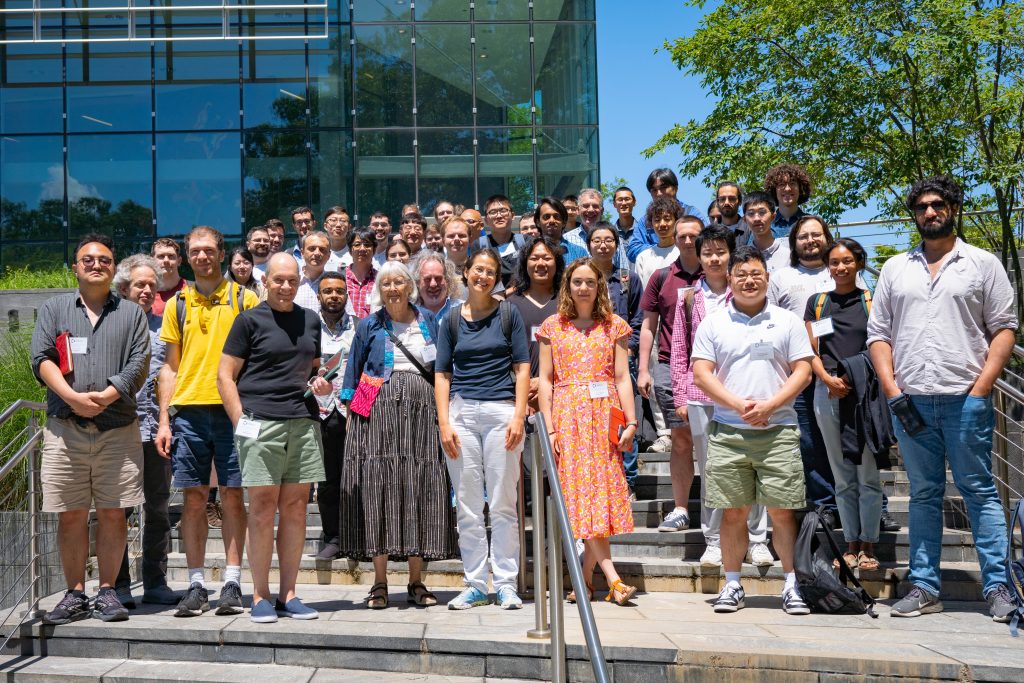
Week 2 (July 8-12)
Theme: Moduli of Higgs bundles and the Langlands program
The geometry of the moduli of Higgs bundles on an algebraic curve is studied from different perspectives in many different disciplines. Under the Hitchin fibration, moduli spaces of semistable Higgs bundles are important examples of algebraic completely integrable systems, and are studied in mathematical physics from this perspective. These moduli spaces also serve as local models for Lagrangian fibrations arising in the study of compact hyperkaehler manifolds.
The nonabelian Hodge correspondence identifies moduli spaces of Higgs bundles with character varieties, moduli spaces of representations of the fundamental group of the curve. This diffeomorphism of moduli spaces has revealed surprising connections, still being explored, between the topology of these integral systems and the topology and Hodge theory of character varieties.
The moduli of Higgs bundles also makes contact with number theory and representation theory via the Langlands program. Building on ideas in the proof of the Langlands correspondence for GL_n over function fields in finite characteristic, Beilinson and Drinfeld proposed the geometric langlands program, which primarily focuses on a quantization of the moduli space of Higgs bundles. Fully developing the latter program has been an inspiration for many developments in derived algebraic geometry.
The moduli theoretic perspective has also influenced the classical Langlands program in important ways, such as the use of Hitchin fibrations in finite characteristic in Ngo’s proof of the fundamental lemma. The interaction between geometric and arithmetic Langlands has grown even closer over the past few years, with the work of Fargues-Scholze formulating the local Langlands correspondence in a geometric context, and the work of Arinkin-Gaitsgory-Kazhdan-Raskin-Rozenblyum-Varshavsky reformulating and generalizing geometric Langlands to include the Langlands correspondence for function fields in finite characteristic as a special case.
Special Event: Tuesday, July 9th, 2024 – Moduli Journal Launch Celebration
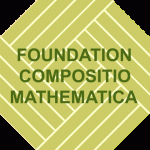
The Foundation Compositio Mathematica is supporting this special day dedicated to the launch of the Moduli Journal during the 2nd SCGP Math Summer workshop.
The day will include special talks from diverse mathematicians, followed by a Jazz Concert from the 2024 SCGP Summer Concert Series, and conclude with a Special Banquet Dinner at 6:15PM in the SCGP Cafe.
Talk Schedule Week 2
| Time | Title | Speaker | Location |
| 8:30am | Breakfast | N/A | SCGP Cafe |
| 9:30am | Mini-course 1: Mirror symmetry and big algebras | Tamás Hausel | SCGP 102 |
| 10:45am | Coffee Break | N/A | SCGP Cafe |
| 11:30am | Mini-course 1: The smoothing problem for algebraic cycles | Claire Voisin | SCGP 102 |
| 12:45pm | Lunch | N/A | SCGP Cafe |
| 3:30pm | Tea Break | N/A | SCGP Cafe |
| Time | Title | Speaker | Location |
| 8:30am | Breakfast | N/A | SCGP Cafe |
| 9:30am | Mini-course 1: The moduli of G-bundles on the curve | Laurent Fargues | SCGP 102 |
| 11:00am | Group Photo | N/A | SCGP Lobby |
| 11:30am | Lunch | N/A | SCGP Cafe |
| 2:00pm | On quasimap invariants of moduli spaces of Higgs bundles | Denis Nesterov | Zoom |
| 2:30pm | Symmetric tensors on the intersection of two quadrics and Lagrangian fibration | Claire Voisin | SCGP 102 |
| 3:00pm | Tea Break | N/A | SCGP Cafe |
| 3:30pm | GV and GW invariants via the enhanced movable cone | David Nabijou | Zoom |
| 4:00pm | The algebraic and analytic compactifications of the Hitchin moduli space | Richard Wentworth | SCGP 102 |
| 5:00pm | Summer Concert Series: Jazz Loft Originals | N/A | SCGP 103 |
| 6:15pm | Special Banquet Dinner: Moduli Journal Launch Celebration | N/A | SCGP Cafe |
| Time | Title | Speaker | Location |
| 8:30am | Breakfast | N/A | SCGP Cafe |
| 9:30am | Mini-course 1: Moduli of A-branes | Mohammed Abouzaid | SCGP 102 |
| 10:45am | Coffee Break | N/A | SCGP Cafe |
| 11:30am | Mini-course 2: Mirror symmetry and big algebras | Tamás Hausel | SCGP 102 |
| 12:45pm | Lunch | N/A | SCGP Cafe |
| 3:30pm | Tea Break | N/A | SCGP Cafe |
| Time | Title | Speaker | Location |
| 8:30am | Breakfast | N/A | SCGP Cafe |
| 9:30am | Mini-course 2: The smoothing problem for algebraic cycles | Claire Voisin | SCGP 102 |
| 10:45am | Coffee Break | N/A | SCGP Cafe |
| 11:30am | Mini-course 2: Moduli of A-branes | Mohammed Abouzaid | SCGP 102 |
| 12:45pm | Lunch | N/A | SCGP Cafe |
| 3:30pm | Tea Break | N/A | SCGP Cafe |
| Time | Title | Speaker | Location |
| 8:30am | Breakfast | N/A | SCGP Cafe |
| 9:30am | Mini-course 2: The moduli of G-bundles on the curve | Laurent Fargues | SCGP 102 |
| 10:45am | Coffee Break | N/A | SCGP Cafe |
| 11:30am | Mini-course 3: Mirror symmetry and big algebras | Tamás Hausel | SCGP 102 |
| 12:45pm | Lunch | N/A | SCGP Cafe |
| 3:30pm | Tea Break | N/A | SCGP Cafe |
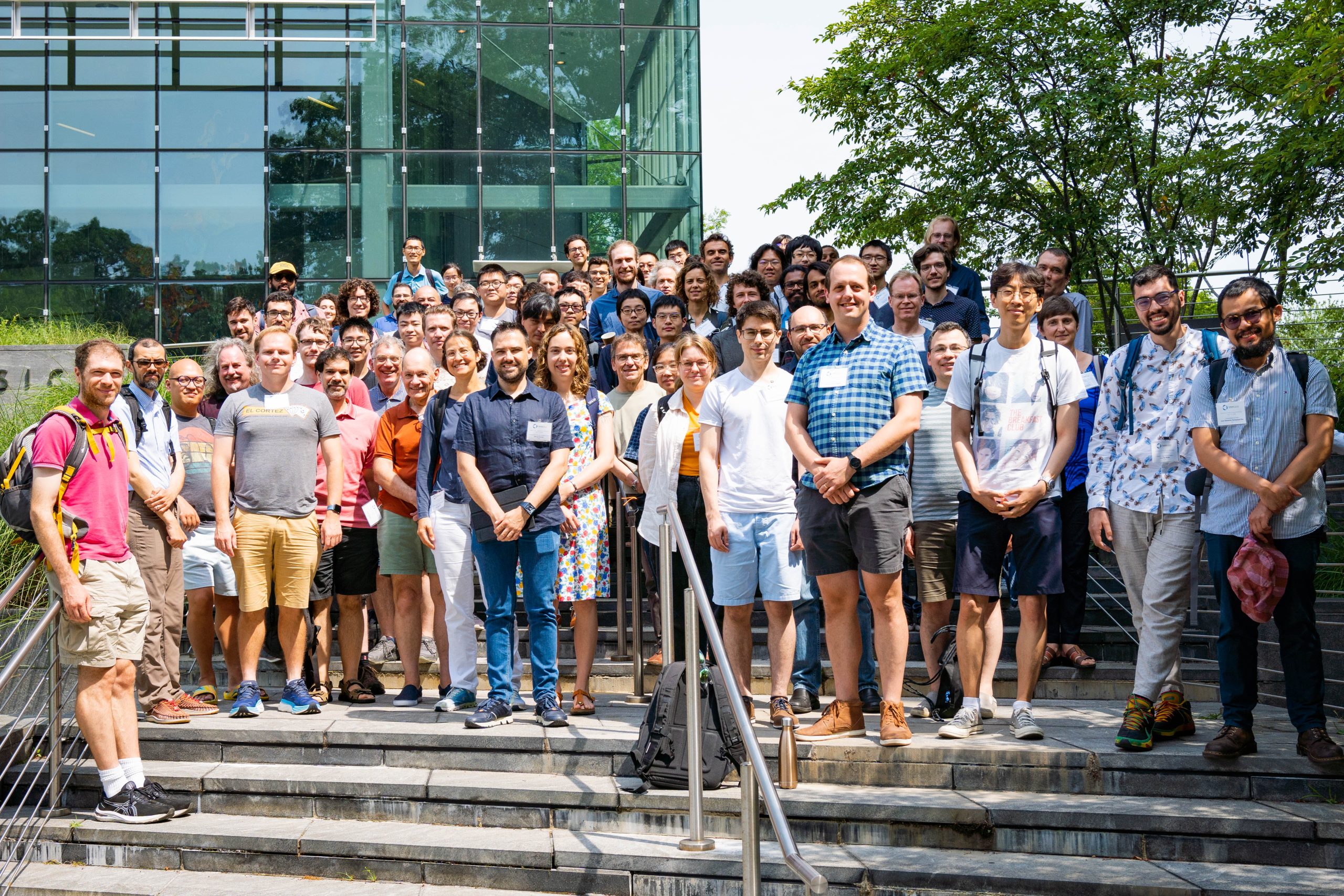
Week 3 (July 15-19)
Theme: Compactifications of moduli spaces
Many moduli spaces are inherently non-compact. Studying different ways to compactify them is interesting in its own right, and at the same time provides important tools to understand the fine structure of the moduli spaces themselves better. If individual points in a moduli space parameterize a certain kind of geometric structure, then points in the boundary correspond to interesting ways in which that structure can degenerate.
The constructions of compactifications involve very different techniques, ranging from classical algebraic, geometric, or analytical tools into tropical geometry.
Well known compactifications of the moduli space of Riemann surfaces, like the Deligne-Mumford compactification, inspire new compactifications of other, more complicated moduli spaces. Tropical geometry plays an important role in the construction of compactifications. In recent years ideas from physics have led to new constructions of compactifications of the Higgs bundle moduli space, and the introduction of the real spectrum compactification of representation varieties has unified many previous approaches.
The Workshop will conclude after lunch on the 19th.
Talk Schedule Week 3
| Time | Title | Speaker | Location |
| 8:30am | Breakfast | N/A | SCGP Cafe |
| 9:30am | Higgs bundles and nonabelian Hodge | Andrew Neitzke | SCGP 102 |
| 10:45am | Coffee Break | N/A | SCGP Cafe |
| 11:30am | Moduli spaces of abelian varieties via tropical geometry | Melody Chan | SCGP 102 |
| 12:45pm | Lunch | N/A | SCGP Cafe |
| 3:30pm | Tea Break | N/A | SCGP Cafe |
| Time | Title | Speaker | Location |
| 8:30am | Breakfast | N/A | SCGP Cafe |
| 9:30am | Compactification of moduli spaces of differentials: logarithmic and multi-scale. | Martin Moeller | SCGP 102 |
| 10:45am | Group Photo | N/A | SCGP Lobby |
| 12:00pm | Lunch | N/A | SCGP Cafe |
| 2:30pm | Forward-looking talk | Mike Wolf | SCGP 102 |
| 5:00pm | Summer Concert Series | N/A | SCGP 103 |
| Time | Title | Speaker | Location |
| 8:30am | Breakfast | N/A | SCGP Cafe |
| 9:30am | Higgs bundles and nonabelian Hodge | Andrew Neitzke | SCGP 102 |
| 12:00pm | Lunch | N/A | SCGP Cafe |
| 2:30pm | À la recherche de l’espace perdu : in search of good moduli spaces | Nikita Nekrasov | SCGP 102 |
| 3:30pm | Tea Break | N/A | SCGP Cafe |
| Time | Title | Speaker | Location |
| 8:30am | Breakfast | N/A | SCGP Cafe |
| 9:30am | Moduli spaces of abelian varieties via tropical geometry | Melody Chan | SCGP 102 |
| 12:00pm | Lunch | N/A | SCGP Cafe |
| 2:30pm | From the Classical Langlands Program to the geometric one | Laurent Fargues | SCGP 102 |
| 3:30pm | Tea Break | N/A | SCGP Cafe |
| 6:00pm | Banquet Dinner | N/A | SCGP Cafe |
| Time | Title | Speaker | Location |
| 8:30am | Breakfast | N/A | SCGP Cafe |
| 9:30am | Compactification of moduli spaces of differentials: logarithmic and multi-scale. | Martin Moeller | SCGP 102 |
| 12:00pm | Lunch | N/A | SCGP Cafe |
